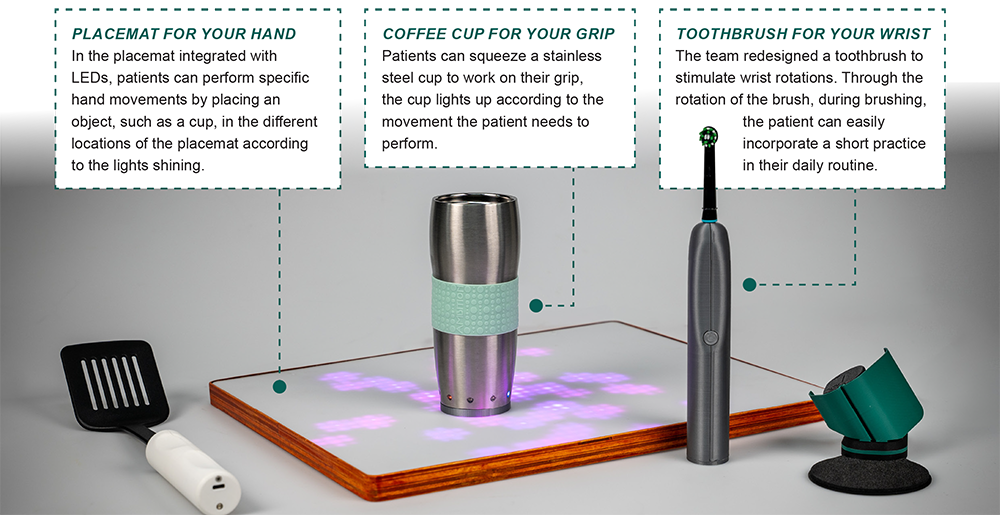
A NEW WAY TO HEAL AT HOME
Physiotherapy is crucial for ensuring physical mobility after situations such as a stroke or surgery. Physiotherapy aims for patients to regain movement, reduce muscle atrophy, and encourage brain plasticity through active physical exercises at a clinic along the physiotherapist.
After some time, the patients are given the responsibility of doing their exercises at home to further continue their recovery process. In the case of hand and wrist therapy, the recommended 30 minutes of daily exercise is necessary to keep the arm-wrist functional, while it can feel boring and difficult to be consistent at. Inconsistency in doing the exercises, in turn, slows down their recovery process or even reverses the mobility gained.
But what if brushing your teeth or drinking your morning coffee could help you get better
With these patients in mind, a multidisciplinary group of researchers at the University of Twente had an innovative idea to support their recovery process. Researchers Juliet Haarman, Kostas Nizamis, Emiel Harmsen and Armağan Karahanoğlu have been delving into the use of everyday objects as tools for recovery and transforming regular household objects into tools for smart hand-training.
Designing for wellbeing
The process of developing technologies can gain valuable insights and data from collaborating across societal groups. The development process, especially for the healthcare sector, can benefit from the expertise of stakeholders by learning from patients’ experiences and the lessons learned from healthcare professionals to create a well rounded intervention. The Freehabilitation consortium embraced this collaborative approach and partnered with Roessingh Research and Development, Roessingh Rehabilitation Centre, Hankamp Rehab, ZGT, and Saxion University to work along with patients and physiotherapists.
The group began, back in 2019, with a focus on developing wearable robotics to support hand-training. This type of rehabilitation is recommended for stroke patients who need to maintain or regain wrist movement. Stroke patients may face additional challenges during their recovery process, thus it is important to create an easy-to-adopt training practice. Shortly after their start with the project, researchers identified that using patients’ everyday objects made the physiotherapy session easier to follow and adopt.
Practicing around the house
The research team explored common household items – and based on the input from patients and experts – a toothbrush, a placemat, a cooking spatula, a computer mouse and a coffee cup resulted in potential objects to work as exercise tools. The goal for these tools is to be helpful for the patient’s recovery, not to generate additional frustration. These familiar objects can then be adapted to practice specific movements depending on the patient’s needs.
A collaborative design practice enables researchers to learn from other’s experiences, collect their feedback, and include the final user in the design process. Researchers started gaining feedback since the initial testing of these tools, thus allowing them to make improvements according to the needs of patients and health professionals. With the gained insights the group modified materials and the way of interacting with the tools to create a more pleasant and fruitful physiotherapy practice.
Time to recover at home
The next step for the project is to carry out four-week trials with stroke patients at home. Over this time, researchers will track how often the patients use the tools and for how long. First, they need to validate that these new tools are being used by the patients, if they adopt them then testing can focus on their health impact compared to traditional exercises.
Future plans for the project include to extend the range of tools available to incorporate other household objects, allowing physiotherapists to fit the objects to the recommended routine. The exercises into their daily life through these tools could make their recovery process easier and more pleasant.
New ways to heal
Engaging recovering stroke patients in at-home physiotherapy has proven challenging to achieve through traditional approaches. Freehabilitation aims to engage with patients during their daily routine in a way that does not require them to allocate additional time for doing their exercises. By seamlessly embedding the exercises into their daily activities, patients will increase their training time throughout the day.
The Freehabilitation group is working to bring this innovative idea into reality and support stroke patients to have a less challenging road to recovery. These tools have the potential to reinvent physiotherapy through their unique approach to the recovery experience. Learning from patients and clinicians to design such tools can greatly benefit the healthcare community around the world.

